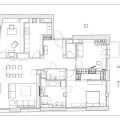What is vastu?
 Vastu houseThis is an ancient Indian teaching that describeslayout of a house built in harmony with the laws of nature. This teaching originated long before the advent of Hinduism, that is, more than 10,000 years ago. Its founders are considered to be Indian sages, the forefathers of yoga. Both yoga and vastu are designed to improve the physical, emotional and spiritual well-being of a person. Only yoga focuses on the body, and vastu on the environment surrounding this body.
Vastu houseThis is an ancient Indian teaching that describeslayout of a house built in harmony with the laws of nature. This teaching originated long before the advent of Hinduism, that is, more than 10,000 years ago. Its founders are considered to be Indian sages, the forefathers of yoga. Both yoga and vastu are designed to improve the physical, emotional and spiritual well-being of a person. Only yoga focuses on the body, and vastu on the environment surrounding this body.
Vastu and Feng Shui
Some scientists believe that feng shui takesits origins in the teachings of vastu. The set of rules that help to harmonize space most likely penetrated into China together with merchants and sailors who traded with India, and monks then organized this knowledge and gave it a new direction. Both sciences really have a lot in common. In particular, the concept of harmonious circulation of energy in the house. In vastu, this substance is called prana, . However, if the Chinese teaching is aimed mainly at the internal arrangement of the home, then vastu attaches great importance to the organization of the external environment - in particular, it is concerned with the shape of the site and its orientation to the cardinal points. For example, according to ancient Indian canons, houses and the sites on which they are built must necessarily be rectangular. This, according to vastu experts, allows you to concentrate vital energy coming from the north and east there, and at the same time protect the inhabitants of the house from the negative influence coming from the west and south. Even the taste of the soil is important according to Vastu. You need to taste it before buying it. Sour soil is good for those who are engaged in business, bitter soil is ideal for the military, and sweet soil is suitable for teachers and scientists. As in the Chinese teaching of Feng Shui, Vastu considers garbage and disorder to be the main reason for the lack of harmony and well-being in the house.
Orientation on the ground
Vastu adherents believe that thoughts andA person's mental state directly depends on the harmonious circulation of energy in his house and on the plot. The main goal of the teaching is to attract positive forces of nature into the house and block negative flows. Based on this, the orientation of the rooms in the house to the cardinal points is very important. Therefore, before you start studying vastu, you should arm yourself with a compass. According to Vedic science, the north side of the house is responsible for work and professional activity, the southwest - for relationships. The northwest is allocated for walks, and the northeast - for education. Guided by this division, ancient Indian architects not only planned the interior space of the home, but also built entire cities. Vastu pays special attention to the eastern and western parts of the house, since these are the areas that receive the greatest charge of solar energy. And the more sun in the house, the more harmonious and prosperous the life of its inhabitants. North and south according to vastu are fed by the energy of the earth and the poles of the planet. It is important that the interior layout of the house allows solar and magnetic energies to flow clockwise and accumulate in the southwestern part of the room. In a non-rectangular building, in which there are extensions or missing corners, the energy begins to stagnate, which, according to Indian sages, leads to depression and ruin. The main place in the house is its center. The flow of cosmic energy passes through it. So that nothing interferes with this process, the center of the house according to vastu should remain absolutely empty (in India, a statue of Buddha is placed in this place) and perfectly clean. This is interesting
- 10 principles of Ayurveda nutrition
Sex is a source of vital energy









